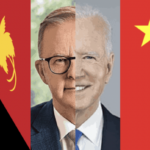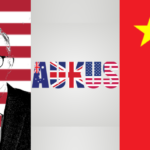Albanese Has Agreed to Australia Being Designated a US Domestic Military Source in Law

Since PM Anthony Albanese graced San Diego with his presence to announce the details of the close to half a trillion dollar AUKUS nuclear-powered submarine deal in March, discussion over whether the federal government is eroding Australian sovereignty to the benefit of the US has raged.
This debate has been ongoing since the Joint Defence Facility Pine Gap began operating in 1970, and has been rising since the 2014 Force Posture Agreement officially established an escalating US local military presence, with ever-growing interoperability between the forces of both nations.
As AUKUS is imposed upon the public as part of a US military build-up against China, and the mainstream media posits Beijing the aggressor, it’s actually Washington vying for war in an attempt to stifle Chinese economic growth, with Australia set to blindly follow as it always has since Korea.
Indeed, our nation is increasingly becoming a US vassal state. A constant marine presence has been established, the US has access to local bases, which it can take control of at times, while the sub deal sees billions handed to the US and UK, as our allies turn the country into a frontline attack base.
Yet, unbeknownst to most of the nation, Albanese and US president Joe Biden released a 20 May statement to enhance the alliance between nations, which, amongst other measures, explains that the White House is attempting to class Australia as a US domestic source for military production.
Vassal state status
Biden plans to ask US Congress “to add Australia as a ‘domestic source’ within the meaning of Title III of the US Defense Production Act of 1950, the statement reads, adding this would streamline tech collaboration, accelerate the AUKUS deal and provide the US with access to Australian minerals.
And it further adds that this process should speed up Japan’s involvement in local force posture initiatives, so that Tokyo will also have a permanent military presence here, along with the US, and now the UK, as the AUKUS deal involves establishing a joint US-UK submarine presence by 2027.
Title III of the DPA provides the US president with a range of financial measures to establish purchase commitments that will “improve, expand, and maintain domestic production capabilities needed to support national defense and homeland security procurement requirements”.
The May briefing note adds that the aim is to prioritise “improving information sharing and technology cooperation mechanisms required to advance our defence and security collaboration, including through AUKUS”.
But, under the US International Traffic in Arms Regulations regime, which aims to restrict and control export of its capabilities, any information a foreign entity shares with it becomes US property and is subject to export restrictions, even to country of origin, unless the White House permits it.
And just for good measure, Albanese has also agreed to the establishment of a new Australia-based NASA ground station, under the Artemis Accords, which will see “the controlled transfer of sensitive US launch technology and data while protecting US technology”.
Volatile arrangements
As stated, the intent to turn us into a US domestic military source, will also provide it with access to critical minerals, including lithium. Australia supplies 53 percent of lithium globally, and this deal will have the knock-on effect of eroding China’s dominance in acquiring and refining the mineral.
After Australia carries out early refinement, China then further treats it for technological use. But the New York Times recently outlined that the Albanese government is purposely attempting to break Beijing’s hold on processing and instead, conduct this at home and then sell it to allies like the US.
The final refinement stage makes it possible for the substance to be used in batteries and defence capabilities. And under recently established US law, Australian companies can obtain loans or subsidies to develop their capabilities, which will then impact the Chinese economy significantly.
The government has outlined that it wants to produce 20 percent of the world’s refined lithium in this country by 2027, which is a process that would further strain Canberra’s relationship with Beijing, as lithium exports are a key part of it.
Our nation now has two lithium refining plants, with the largest a joint venture between US chemical maker Albemarle and Australian mining company Mineral Resources. And it’s also opening the path for further US and European investment in the local industry.
But cutting supply of lithium to China will be a major source of tension between our nation and its largest trading partner. And Australian resources minister Madeleine King has recently stated this shift is designed to weaken Chinese dominance.
The war machine down under
For Australians who are concerned with the weakening of Australian sovereignty, as the White House continues to make inroads militarily into this country, the classification of our nation as part of the US domestic sphere, should sound alarm bells.
A large community meeting in Sydney’s Marrickville Town Hall in March saw speakers spelling out to those gathered that the Australian public is being lied to about the threat China poses, and the US is primarily interested in crushing Chinese economic power to prevent it surpassing its own.
The build up to war with China, commenced with the Obama administration’s 2011 Pivot to Asia, which signalled that the US was winding down its two decades old warring on the Middle East project and that the Indo Pacific was now central, with China being the target an open secret.
The US economy runs on constant war, as its military-industrial complex is so strong that without launching attacks on other nations under whatever pretence it can contrive, its economic dominance would fall flat.
And regrettably, as hawkish Australian defence minister Richard Marles released the Defence Strategic Review 2023 in April, along with the government response, it seems our nation is set for a massive expansion of its military industry, which will increasingly see us turning to war for profit.







